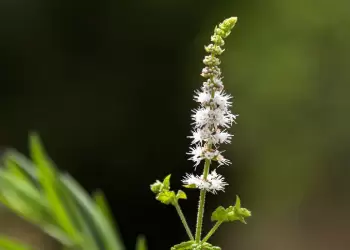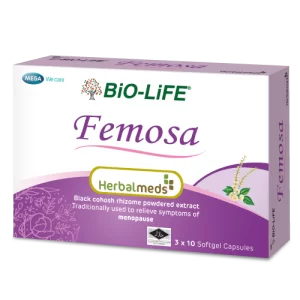
Cope with Your Menopause Confidently
Dec 1, 2021
Introduction
Menopause is the cessation of menstruation and the end of a woman’s reproductive period. It typically occurs in women at about 51 years of age, but may occur as young as 40. This natural biological process of aging happens as the level of female hormones (estrogen and progesterone) declines as women get older. Menopausal symptoms can affect women physically and emotionally. Common symptoms include hot flashes, night sweats, sleep disturbances, anxiety, irritability, vaginal dryness, heart palpitations, tinnitus, and vertigo. The duration and severity of these symptoms vary from woman to woman.
What is Black Cohosh?

Black cohosh, or Cimicifuga racemose, is a perennial plant of the Buttercup family native to North America. Black cohosh has a long history of use as herbal remedy or dietary supplement due to its high level of safety and efficacy. The part of the black cohosh plant used in herbal preparations is the root or rhizome (underground stem). Black cohosh is used by millions of women worldwide for the relief of menstrual discomfort and menopausal symptoms1.
Black Cohosh and Menopausal Symptoms
Black cohosh has been extensively studied for its beneficial effects in relieving menopausal symptoms. The specific mechanism of action for black cohosh rhizome powdered extract treatment for menopausal symptoms involve:
1. In hot flashes
Black cohosh helps to create central action in reducing hot flashes via brain chemical acting substances that helps the brain send messages to other parts of the body2. Furthermore, it reduces the release of hormones that corresponds with hot flashes3.

2. In other menopausal symptoms
Black cohosh prevents thinning, drying, and inflammation of the vaginal walls and relieves symptoms of vaginal dryness4. It also increases the activity of bone-forming cells, resulting in bone regeneration4.

Black cohosh could be an effective alternative if you are seeking natural treatment options using herbal medicine for menopause symptoms.

Find out more about Herbalmeds Femosa
References
- Wobser RW, Takov V. Black Cohosh. [Updated 2020 Dec 5]. In: StatPearls [Internet]. Treasure Island (FL): StatPearls Publishing; 2021 Jan-. Available from: https://www.ncbi.nlm.nih.gov/books/NBK470187/
- Wuttke, W., & Seidlová-Wuttke, D. (2015). Black cohosh (Cimicifuga racemosa) is a non-estrogenic alternative to hormone replacement therapy. Clinical Phytoscience, 1(1).
- Wuttke, W., Jarry, H., Haunschild, J., Stecher, G., Schuh, M., & Seidlova-Wuttke, D. (2014). The non-estrogenic alternative for the treatment of climacteric complaints: Black cohosh (Cimicifuga or Actaea racemosa). The Journal of Steroid Biochemistry and Molecular Biology, 139, 302-310.
- Wuttke, W., Seidlová-Wuttke, D., & Gorkow, C. (2003). The Cimicifuga preparation BNO 1055 vs. conjugated estrogens in a double-blind placebo-controlled study: Effects on menopause symptoms and bone markers. Maturitas, 44, S67-S77.



